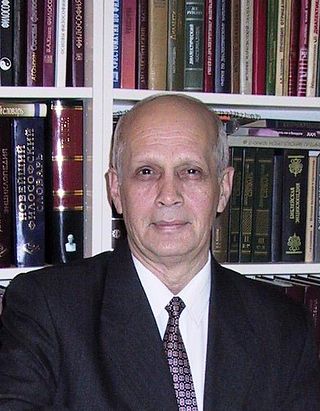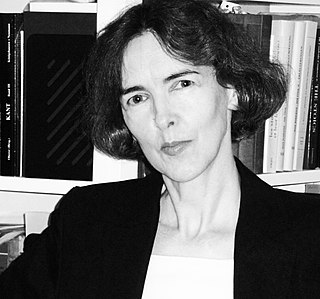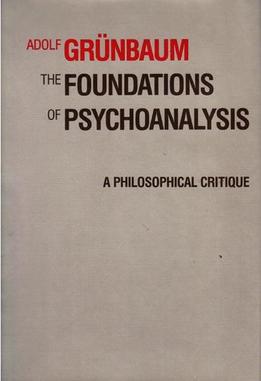
John Henry McDowell is a South African philosopher, formerly a fellow of University College, Oxford, and now university professor at the University of Pittsburgh. Although he has written on metaphysics, epistemology, ancient philosophy, nature, and meta-ethics, McDowell's most influential work has been in the philosophy of mind and philosophy of language. McDowell was one of three recipients of the 2010 Andrew W. Mellon Foundation's Distinguished Achievement Award, and is a Fellow of both the American Academy of Arts & Sciences and the British Academy.
Adolf Grünbaum was a German-American philosopher of science and a critic of psychoanalysis, as well as Karl Popper's philosophy of science. He was the first Andrew Mellon Professor of Philosophy at the University of Pittsburgh from 1960 until his death, and also served as co-chairman of its Center for Philosophy of Science, research professor of psychiatry, and primary research professor in the department of history and philosophy of science. His works include Philosophical Problems of Space and Time (1963), The Foundations of Psychoanalysis (1984), and Validation in the Clinical Theory of Psychoanalysis (1993).
Julia Elizabeth Annas is a British philosopher who has taught in the United States for the last quarter-century. She is Regents Professor of Philosophy Emerita at the University of Arizona.
Laurence Jonathan Cohen,, was a British philosopher. He was Fellow and Praelector in Philosophy, 1957–90 and Senior Tutor, 1985–90 at The Queen's College, Oxford and British Academy Reader in Humanities, University of Oxford, 1982–84.
Timothy John Smiley FBA is a British philosopher, appointed Emeritus Knightbridge Professor of Philosophy at Clare College, Cambridge University. He works primarily in philosophy of mathematics and logic.

Mark Solms is a South African psychoanalyst and neuropsychologist, who is known for his discovery of the brain mechanisms of dreaming and his use of psychoanalytic methods in contemporary neuroscience. He holds the Chair of Neuropsychology at the University of Cape Town and Groote Schuur Hospital and is the President of the South African Psychoanalytical Association. He is also Research Chair of the International Psychoanalytical Association.

Victor Ovcharenko was a Russian philosopher, sociologist, historian and psychologist. He also was a PhD., professor, academician of the Russian Academy of Natural Sciences (1997), academician of the Academy for Humanities Research (1998) and academician of the Academy of Pedagogical and Social Sciences (2000). He co-edited the journals The Psychoanalytical Bulletin, The Bulletin of Psychoanalysis, etc. He was a forerunner of the Minsk philosophical school "Humanities Encyclopedia". He is considered one of the founders of modern Belarusian sociology.

John Corcoran was an American logician, philosopher, mathematician, and historian of logic. He is best known for his philosophical work on concepts such as the nature of inference, relations between conditions, argument-deduction-proof distinctions, the relationship between logic and epistemology, and the place of proof theory and model theory in logic. Nine of Corcoran's papers have been translated into Spanish, Portuguese, Persian, and Arabic; his 1989 "signature" essay was translated into three languages. Fourteen of his papers have been reprinted; one was reprinted twice.

Tamar Szabó Gendler is an American philosopher. She is the Dean of the Faculty of Arts and Sciences at Yale as well as the Vincent J. Scully Professor of Philosophy and a Professor of Psychology and Cognitive Sciences at Yale University. Her academic research focuses on issues in philosophical psychology, epistemology, metaphysics, and areas related to philosophical methodology.

Knowledge and Human Interests is a 1968 book by the German philosopher Jürgen Habermas, in which the author discusses the development of the modern natural and human sciences. He criticizes Sigmund Freud, arguing that psychoanalysis is a branch of the humanities rather than a science, and provides a critique of the philosopher Friedrich Nietzsche.

Susanne Bobzien is a German-born philosopher whose research interests focus on philosophy of logic and language, determinism and freedom, and ancient philosophy. She currently is senior research fellow at All Souls College, Oxford and professor of philosophy at the University of Oxford.

The Foundations of Psychoanalysis: A Philosophical Critique is a 1984 book by the philosopher Adolf Grünbaum, in which the author offers a philosophical critique of the work of Sigmund Freud, the founder of psychoanalysis. The book was first published in the United States by the University of California Press. Grünbaum evaluates the status of psychoanalysis as a natural science, criticizes the method of free association and Freud's theory of dreams, and discusses the psychoanalytic theory of paranoia. He argues that Freud, in his efforts to defend psychoanalysis as a method of clinical investigation, employed an argument that Grünbaum refers to as the "Tally Argument"; according to Grünbaum, it rests on the premises that only psychoanalysis can provide patients with correct insight into the unconscious pathogens of their psychoneuroses and that such insight is necessary for successful treatment of neurotic patients. Grünbaum argues that the argument suffers from major problems. Grünbaum also criticizes the views of psychoanalysis put forward by other philosophers, including the hermeneutic interpretations propounded by Jürgen Habermas and Paul Ricœur, as well as Karl Popper's position that psychoanalytic propositions cannot be disconfirmed and that psychoanalysis is therefore a pseudoscience.

Freud and Philosophy: An Essay on Interpretation is a 1965 book about Sigmund Freud, the founder of psychoanalysis, written by the French philosopher Paul Ricœur. In Freud and Philosophy, Ricœur interprets Freudian work in terms of hermeneutics, a theory that governs the interpretation of a particular text, and phenomenology, a school of philosophy founded by Edmund Husserl. Ricœur addresses questions such as the nature of interpretation in psychoanalysis, the understanding of human nature and the relationship between Freud's interpretation of culture amongst other interpretations. The book was first published in France by Éditions du Seuil, and in the United States by Yale University Press.
Marco Sgarbi is an Italian philosopher and an historian of philosophy, with a special interest in the history of epistemology and logic. He is associate professor at the Ca' Foscari University of Venice. He is member of the Accademia Nazionale Virgiliana.
The Neubauer Collegium for Culture and Society is a collaborative research center located on the campus of the University of Chicago in Chicago, Illinois.
Jon Mills is a Canadian philosopher, psychoanalyst, and clinical psychologist. His principle theoretical contributions have been in the philosophy of the unconscious, a critique of psychoanalysis, philosophical psychology, value inquiry, and the philosophy of culture. His clinical contributions are in the areas of attachment pathology, trauma, psychosis, and psychic structure.

Philosophical Essays on Freud is a 1982 anthology of articles about Sigmund Freud and psychoanalysis edited by the philosophers Richard Wollheim and James Hopkins. Published by Cambridge University Press, it includes an introduction from Hopkins and an essay from Wollheim, as well as selections from philosophers such as Ludwig Wittgenstein, Clark Glymour, Adam Morton, Stuart Hampshire, Brian O'Shaughnessy, Jean-Paul Sartre, Thomas Nagel, and Donald Davidson. The essays deal with philosophical questions raised by the work of Freud, including topics such as materialism, intentionality, and theories of the self's structure. They represent a range of different viewpoints, most of them from within the tradition of analytic philosophy. The book received a mixture of positive, mixed, and negative reviews. Commentators found the contributions included in the book to be of uneven value.
Charles H. Kahn was a classicist and professor emeritus of philosophy at the University of Pennsylvania. His work focused on early Greek philosophy, up to the times of Plato. His 1960 monograph on Anaximander was still as of 2020 the most important reference work on the subject, and his 1979 edition of the Heraclitus fragments likewise remained the most widely cited English translation of Heraclitus, more or less representing the 'standard interpretation' for non-expert scholars.
Asad Q. Ahmed is an American scholar who is the Magistretti Distinguished Professor of Middle Eastern Languages and Culture and Professor of Arabic and Islamic studies in the Department of Middle Eastern Languages and Cultures at the University of California, Berkeley. He is also the director of the Center for Middle Eastern Studies.
Jason Merchant is the Lorna Puttkammer Straus Distinguished Service Professor of Linguistics and Vice Provost for Academic Appointments and Graduate Education at the University of Chicago, as well as Faculty Director of UChicagoGRAD.










